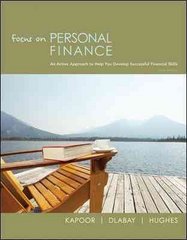Question
21.______Differences between index ETFs and index funds include a. the ability to trade ETFs throughout the day. b. the ability to short ETFs. c. the
21.______Differences between index ETFs and index funds include
a. the ability to trade ETFs throughout the day.
b. the ability to short ETFs.
c. the ability to write and sell options on ETFs.
d. all of the above.
e. more than one, but not all, of the above.
22.______The differences outlined in question 21 are always advantages for ETFs when making the ETF/index fund comparison.
a. yes
b. no
23._____For a long run investor, the practical differences between index ETFs and index funds
a. include all of the answers to question 21.
b. are virtually non-existent, a case of six of one, half a dozen of the other.
24._____Buying bond funds
a. is for income seeking investors.
b. in the eyes of many defeats one of the most salient purposes of buying a bond fund; i.e., near certainty of cash flows.
c. makes sense for credit sensitive bonds.
d. all of the above.
e. more than one, but not all, of the above.
25._____For U.S. investors, the difference(s) between global funds and international funds
a. are non-existent.
b. is that global funds include U.S. investments while international funds do not include U.S. investments.
c. is that international funds include U.S. investments while global funds do not include U.S. investments.
d. all of the above.
e. more than one, but not all, of the above.
Step by Step Solution
There are 3 Steps involved in it
Step: 1

Get Instant Access to Expert-Tailored Solutions
See step-by-step solutions with expert insights and AI powered tools for academic success
Step: 2

Step: 3

Ace Your Homework with AI
Get the answers you need in no time with our AI-driven, step-by-step assistance
Get Started


